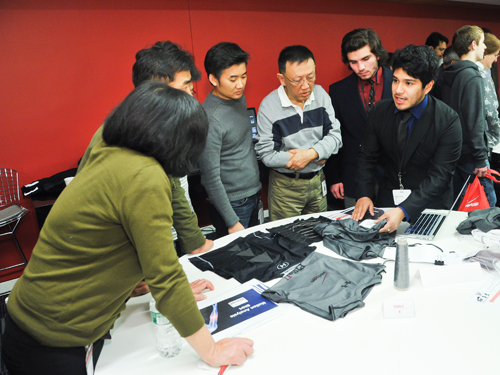Full Transparency
Our editorial transparency tool uses blockchain technology to permanently log all changes made to official releases after publication. However, this post is not an official release and therefore not tracked. Visit our learn more for more information.
What if your shirt could monitor your heart rate, tell you when you're getting dehydrated and keep track of your range of motion during exercise or strenuous activity? A group of undergrads at Philadelphia University has been working to develop a shirt with this kind of wearable tech in collaboration with the Verizon Emerging Technologies team.
The compression shirt, made of polyester and Lycra, might appear to be an ordinary workout top, but it has a soft skeleton of sensors sewn inside it. These sensors monitor your body during physical activity, sending information about your hydration levels, range of motion and heart rate directly to your smart phone.

The sensor shirt project was led by three undergraduate students—one in fashion design and two in engineering—along with Mark Sunderland, a textile engineer and Director of Textile Engineering at Philadelphia University. The team, which first began experimenting with sensors sewn into shirts, is now working on weaving conductive yarns directly into the fabric to make such sensors less obtrusive. In January, they presented the shirt to Marni Walden, Verizon's President of Product Innovation and New Businesses, alongside 20 other innovative technologies.
The project isn't just an opportunity for undergrads to experiment with wearable tech, it also connects them with real-world industry experts and lets them translate their ideas into actual products.
"If you get students on these projects as sophomores and juniors, they become so much more mature about opportunities driven by industry," says Sunderland. "The students are asked to not only maintain the prototype, but to develop a supply chain. There's a real business model attached to it."
The sensor shirt was a product of the Nexus Challenge Industry Project in which PhilaU students took on the task of creating a new type of consumer wearable. The project was collaboration with Verizon and its emerging technologies team, which launched in 2014 to explore new types of devices and technologies to gather and use real-time data, according to Ted Stecko, Device Technologies Manager at Verizon.
These kinds of student-led initiatives have helped Verizon push the boundaries of the technology it’s exploring. "We see [universities] as melting pots and idea factories. These students are part of a new generation," says Stecko. "They are the ones forming the management of companies moving forward."